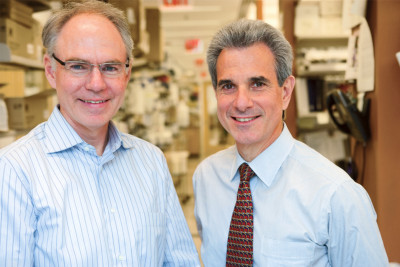
An experimental drug is showing promise for the treatment of men with an aggressive form of advanced prostate cancer. A new multicenter study has concluded that the targeted therapy MDV3100 is safe and effective for patients with castration-resistant prostate cancer (CRPC), known for its poor prognosis and limited treatment options. The research, led by investigators at Memorial Sloan Kettering Cancer Center, appears early online and in an upcoming edition of The Lancet.
According to the findings of the Phase 1-2 study, MDV3100 not only shrank patients’ tumors, but also reduced serum levels of the tumor marker prostate-specific antigen (PSA), stabilized disease that had spread to soft tissues and the bone, and reduced the number of circulating tumor cells in the blood.
“We were encouraged to see antitumor activity in men whose disease had spread to other parts of the body after either becoming resistant to previous hormone treatments or progressing following chemotherapy,” said the study’s lead author Howard Scher, MD, Chief of the Genitourinary Oncology Service at Memorial Sloan Kettering. “These findings strengthen the drug’s potential to change the outlook for a group of patients who currently have limited effective treatment options from which to choose.”
According to the research, MDV3100 slows tumor growth and induces tumor cells to die in men with CRPC, or hormone-refractory disease, which depends on male hormones to grow, but is unresponsive or becomes resistant to standard therapies used to lower or block those hormones. MDV3100 works by blocking testosterone from binding to the androgen (male hormone) receptor, stopping the movement of the androgen receptor to the nucleus of prostate cancer cells, preventing the receptor from binding to DNA, and inducing cancer cell death, even when the expression of the androgen receptor is elevated.
“This study validates what our preclinical studies have suggested: that sustained androgen receptor signaling drives CRPC and that a substantial number of CRPC tumors that progress despite multiple hormone and chemotherapy treatments remain dependent on androgen receptor signaling for growth,” said study co-author, Charles Sawyers, MD, Chair of Memorial Sloan Kettering’s Human Oncology and Pathogenesis Program and a Howard Hughes Medical Institute investigator.
The drug was co-invented by Dr. Sawyers and Michael Jung, PhD, Professor of Chemistry at the University of California, Los Angeles. Their research originally demonstrated that CRPC cells have increased expression of the androgen receptor and that elevated expression of this receptor may contribute to disease progression due to a developed resistance to hormone treatment. Their collaboration led to the discovery of a number of nonsteroidal, small molecule antiandrogen compounds, including MDV3100.
In the current study, 140 patients were treated with doses of MDV3100 ranging from 30 to 600 mg daily. PET imaging, bones scans, and blood tests were used to assess the antitumor effects of the drug, which were observed at all dosages. Investigators reported declines in PSA of at least 50 percent in more than half of the patients and tumor regressions in 22 percent of the patients. Overall, two-thirds of patients had partial remissions or stable disease in tumors that had spread to soft tissue or bone.
The findings also showed that the number of circulating tumor cells fell in 49 percent of patients, and 91 percent of patients who initiated therapy with favorable counts retained favorable counts during treatment. This is important because previous research shows that changes in circulating tumor cell counts after treatment were more predictive of survival than were changes in PSA, with favorable post-treatment counts associated with a 21-month median survival.
The drug was generally well tolerated, with nausea, constipation, diarrhea, and anorexia being the most common mild side effects reported. The most frequently reported Grade 3 side effect at higher doses was fatigue. The researchers determined that the maximum tolerated dose for sustained treatment was 240 mg daily.
Based on the positive results of the current study, a multinational randomized Phase 3 clinical trial has begun to examine MDV3100 versus a placebo for the treatment of men with advanced prostate cancer who were previously treated with chemotherapy. Information about patient eligibility and enrollment can be obtained by visiting www.affirmtrial.com or by calling the AFFIRM study’s toll free hotline at 888-782-3256.
The research was supported by Medivation; the Prostate Cancer Foundation, the National Cancer Institute, the Howard Hughes Medical Institute, and the Department of Defense Prostate Cancer Research Program Clinical Consortium (which includes Memorial Sloan Kettering, the Oregon Health and Science University Knight Cancer Institute, The University of Washington, the Dana-Farber Cancer Institute, and M. D. Anderson Cancer Center).

